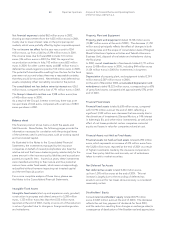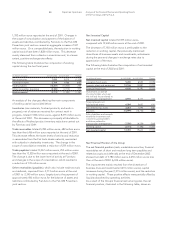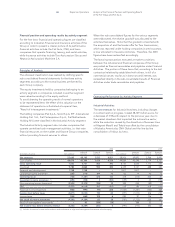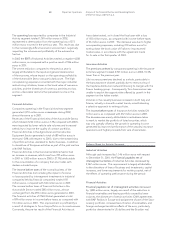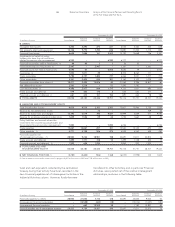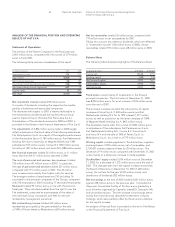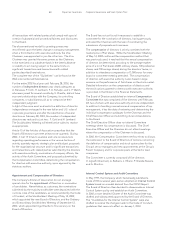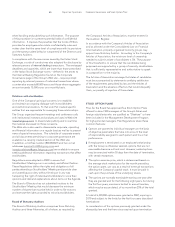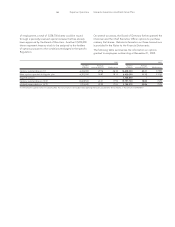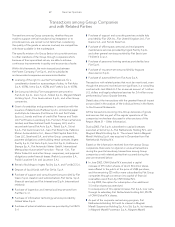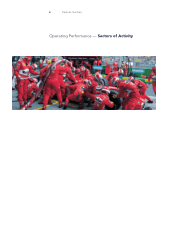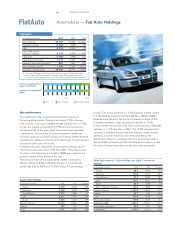Chrysler 2002 Annual Report Download - page 35
Download and view the complete annual report
Please find page 35 of the 2002 Chrysler annual report below. You can navigate through the pages in the report by either clicking on the pages listed below, or by using the keyword search tool below to find specific information within the annual report.
33 Report on Operations Corporate Governance and Stock Option Plans
all transactions with related parties shall comply with special
criteria of substantial and procedural fairness and disclosures
to the Board.
The aforementioned model for granting powers was
reconfirmed upon the latest change in company management,
when a third director with executive authority, the Vice
Chairman, was appointed to join the other two. The Vice
Chairman was granted the same powers as the Chairman,
to be exercised on a substitute basis in the latter’s absence
or inability to act, being subject to the same limits on
significant transactions and transactions with related
parties described hereinabove.
The complete text of the “Guidelines” can be found at the
Web site mentioned hereinabove.
For the entire 2002 fiscal year until February 28, 2003, the
number of independent directors was clearly adequate, as
A. Benessia, F. Cotti, H. Lamberti, F. G. Rohatyn, and J. F. Welch,
who were joined for several months by U. Draetta, did not have
economic relationships with the Company, its controlling
companies, or subsidiaries such as to compromise their
independent judgment.
In light of the more exact and restrictive definition of director
independence envisaged in the new Italian and U.S. rules of
corporate governance and after the substitution of several
directors on February 28, 2003, the number of independent
directors was reduced to just two: F. Cotti and H. Lamberti.
The Stockholders’ Meeting will therefore be called to resolve
as appropriate.
Article 15 of the Articles of Association prescribes that the
Board of Directors must meet at least once quarterly. During
2002, it met 13 times to examine and vote on resolutions
regarding operating performance in the various Sectors of
activity, quarterly reports, strategic plan and budget, proposals
for the organizational structure and for significant transactions
and transactions with related parties submitted by the directors
with executive authority, nominations of company officers, the
activity of the Audit Committee, and proposals submitted by
the Compensation Committee, determining the compensation
for directors with executive authority, upon approval by the
statutory auditors.
Appointment and Compensation of Directors
The Company’s Articles of Association do not envisage
special rules for the appointment of Directors or nomination
of candidates. Nevertheless, as customary, the nominations
submitted by the majority stockholder were deposited with the
curricula vitae of the candidates, as recommended by the Code
of Conduct, at the Stockholders’ Meeting of May 14, 2002,
which appointed the new Board of Directors, and the Ordinary
and Extraordinary Stockholders’ Meeting of September 12,
2002, which appointed Ugo Draetta to fill a vacancy on the
Board of Directors.
The Board has not yet found it necessary to establish a
committee for the nomination of directors, having previously
entrusted the Chairman with the task of coordinating the
submission of proposals and nominees.
The compensation of directors is strictly correlated with the
market price of Fiat shares. While the Stockholders’ Meeting
of May 14, 2002 confirmed the compensation method that
was previously used, it resolved that the annual compensation
of directors be determined according to the average market
price of a lot of Fiat shares (2,000 ordinary shares, 700 preference
shares, and 700 savings shares) during the directors’ terms, in
addition to attendance compensation of 3,000 euros for every
board or committee meeting attended. The compensation
of directors with executive authority is also based in large
measure on the performance of Fiat shares on the stock market.
Detailed information on the compensation of directors and
the stock options granted to directors with executive authority
is provided in the Notes to the Financial Statements.
The Board of Directors established an internal Compensation
Committee that was comprised of five directors until February
28, two of whom with executive authority and one independent.
In addition to handling nominations and compensation of top
management, it has the duty of reviewing and determining the
individual compensation packages for the Chairman and the
Chief Executive Officer and submitting its recommendations
to the Board.
The Chief Executive Officer does not attend Committee
meetings where his compensation is discussed. The Chief
Executive Officer and the Chairman do not attend meetings
where the compensation of the Chairman is discussed.
In 2002, the Compensation Committee met four times to discuss
the submission to the Board of Directors of motions concerning
the definition of compensation and stock option plans for the
Group’s senior managers and new appointments at the Group’s
Parent Company and for corporate posts at the Sector lead
companies.
The Committee is currently comprised of five directors:
U. Agnelli (Chairman), A. Barberis, J. Elkann, F. Grande Stevens
and G. Morchio.
Internal Control System and Audit Committee
In May 1999, the Company, which had already published a
Code of Ethics several years earlier, adopted an Internal Control
System based on a model derived from the COSO Report.
The Board of Directors then decided to disseminate an Internal
Control System policy and establish an Audit Committee.
In 2002 a more detailed Charter of the Audit Committee was
drafted and subsequently approved by the Board of Directors.
The “Guidelines for the Internal Control System” were also
drafted to receive the changes made to the Code of Conduct,
guidelines that came into effect on January 1, 2003.


